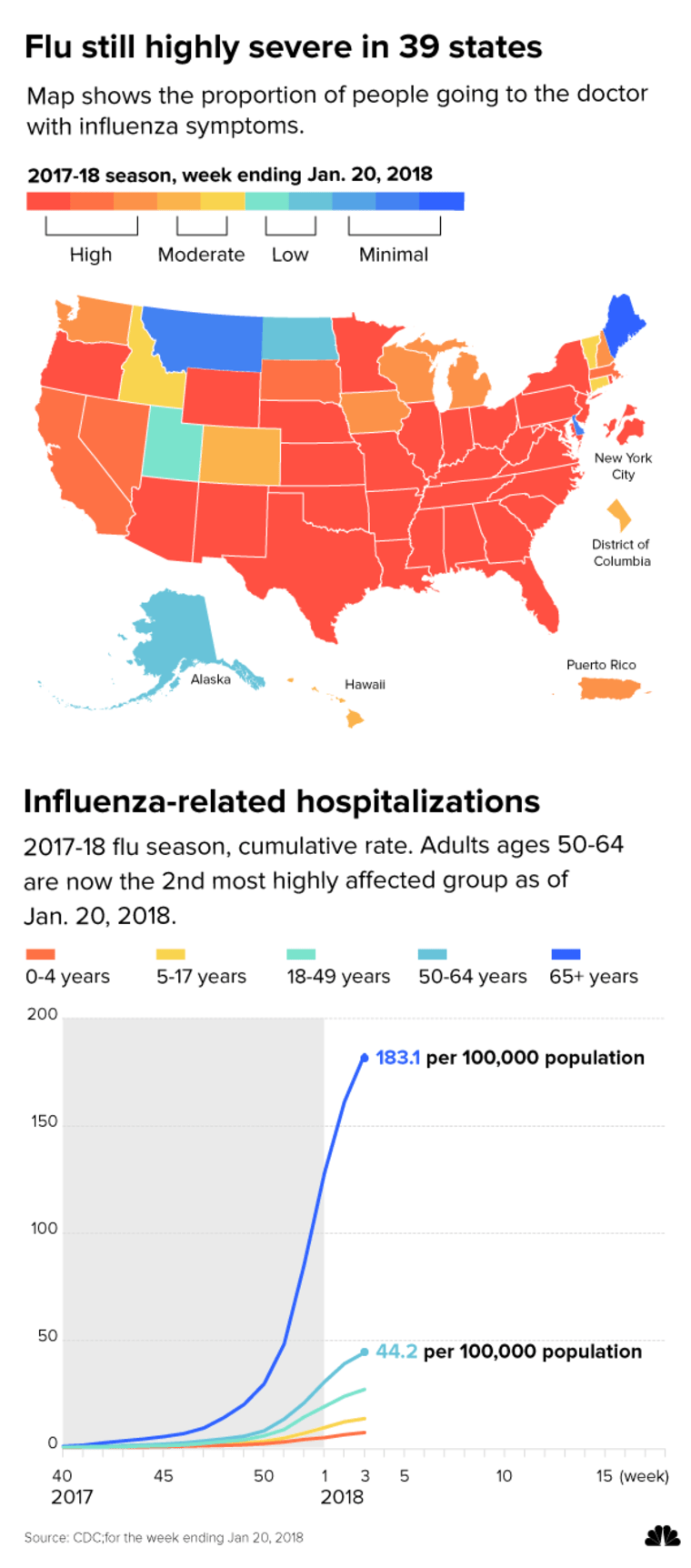The severe and deadly flu season is still getting worse in the US, with adults aged 50-64 being hospitalized for influenza-related illnesses at an unexpectedly high rate, the Centers for Disease Control and Prevention reported Friday.
“Baby boomers now have higher rates of influenza than their grandchildren,” said Dr. Daniel Jernigan, director of the influenza division at the National Center for Immunization and Respiratory Diseases.
The 2017-2018 flu season has the highest number of influenza-related illnesses since the 2009 H1N1 pandemic, which peaked in November that year.
In most flu seasons, the most affected groups are very young children and adults over age 65.
In fact, the highest rate of hospitalization was among those over 65, but people aged 50 to 64 are being hospitalized at three times the rate of the 2015-2016 season, the CDC reported.
"People in this age group are often at the peak of their careers and may miss their flu shots, but the H1N1 strain also affects them more than others."
The influenza viruses sending 50-to-64 year-olds to the hospital are the H3N2 and H1N1 strains. The H3N2 strain tends to be less affected by vaccination and results in more deaths. The less widespread H1N1 virus seems to hitting baby boomers especially hard, affecting this group twice as much as any other.
Related: Here's how the flu virus kills some people so quickly
“People in this age group are often at the peak of their careers and may miss their flu shots, but the H1N1 strain also affects them more than others,” said Jernigan.

Seven more children died in the week ending Jan. 20, for a total of 37 flu-associated pediatric deaths, although the number may be higher because it takes a few weeks for CDC to gather the information and some deaths may have occurred outside the hospital. "This is probably fewer than the actual," Jernigan said during a conference call Friday.
Unfortunately, the flu season doesn't seem to be ending any time soon.
Peak could last several more weeks
For the first time in 13 years of mapping the virus, flu activity is widespread across the entire continental United States at the same time and flu activity has now stayed at the same level at the national level for three weeks in a row, with 49 states reporting widespread activity — two notable characteristics of this flu season, said Jernigan.
Officials predict the illness — which causes fever, chills, a cough, runny or stuffy nose, sore throat, fatigue and muscle aches — will continue to for several more weeks.
While most people with the flu will have a mild illness, it can be severe and even deadly. The CDC recommends that all adults and children get the flu shot, even at this point in the season. The vaccine takes about two weeks to become effective.
“We recommend that everyone get the flu shot to prevent the flu as well as encourage all to wash their hands, cover their mouths, and stay home from work or school if they are experiencing flu like symptoms,” said Jernigan.
Although final data isn't in, it appears that this year's vaccine will be about 30 percent effective in preventing the flu. Even if a person who's been vaccinated gets the flu, the symptoms will be lessened.
Related: Influenza might be spread simply by breathing, study finds
CDC officials also noted spot shortages of anti-viral drugs, like oseltamivir (Tamiflu), but the agency is working with manufacturers to replace gaps in the market.
The CDC recommends the use of antivirals for people at high risk of complications — pregnant women, babies, anyone with a chronic disease like diabetes or asthma and the elderly. The earlier in the illness they are taken, the more effective the medications are.
The officials recommended common-sense approaches to preventing the spread of the flu: Stay home if you have symptoms, if possible; avoid people who are sick; cover your cough; wash hands frequently with soap and water; and disinfect surfaces that may be contaminated.